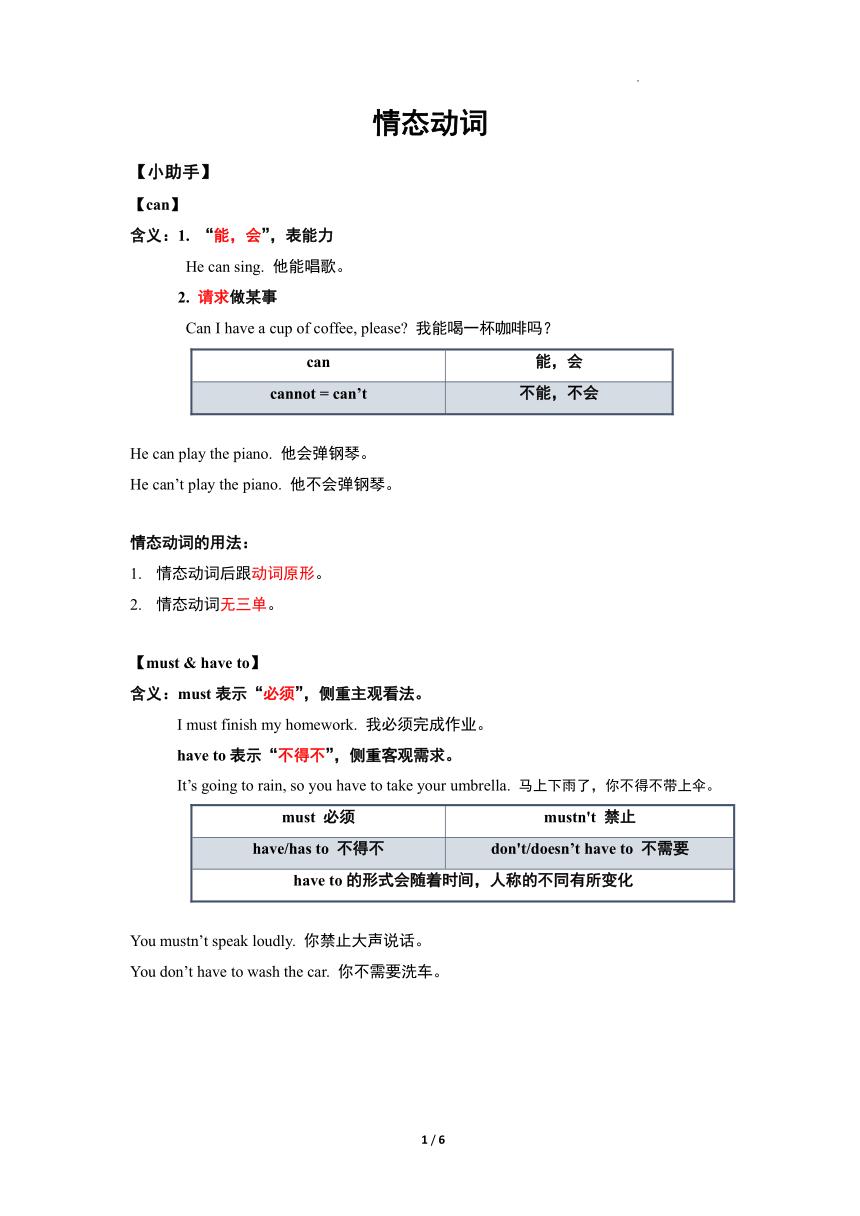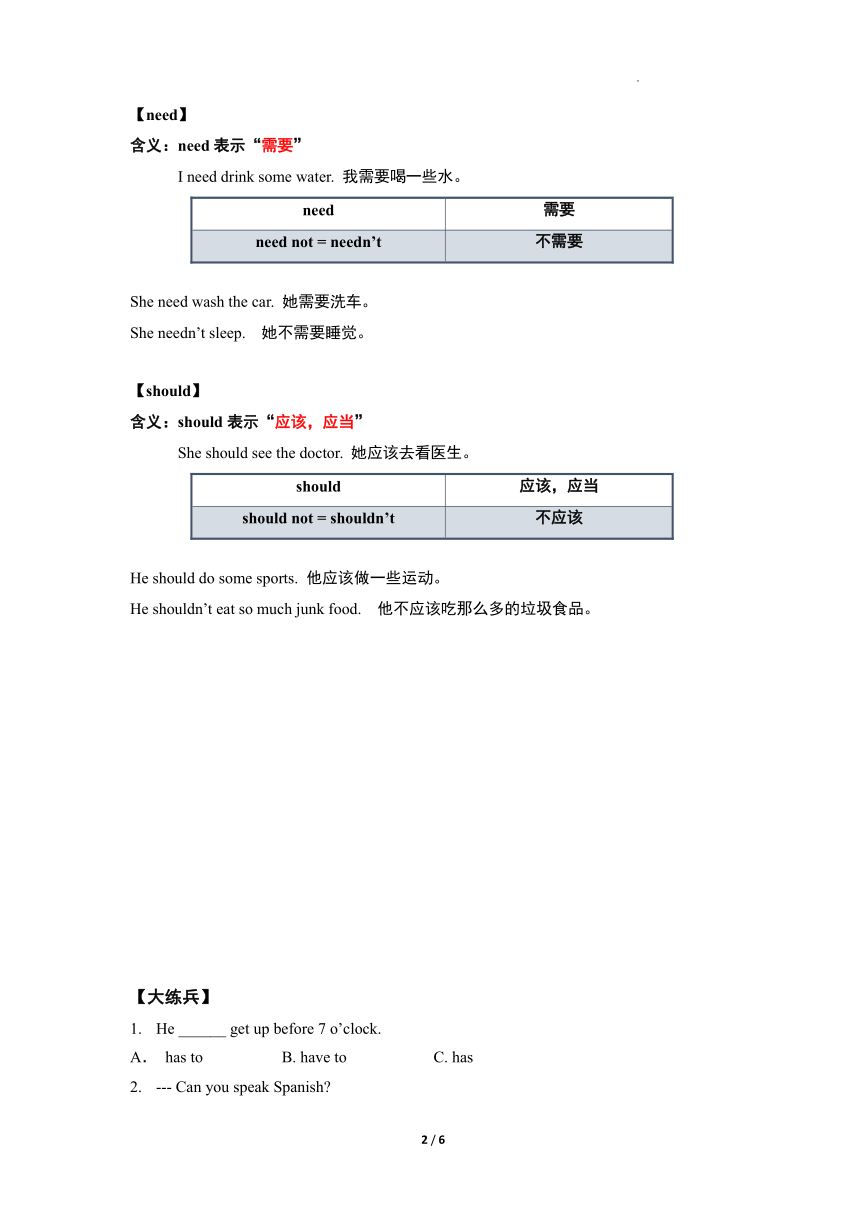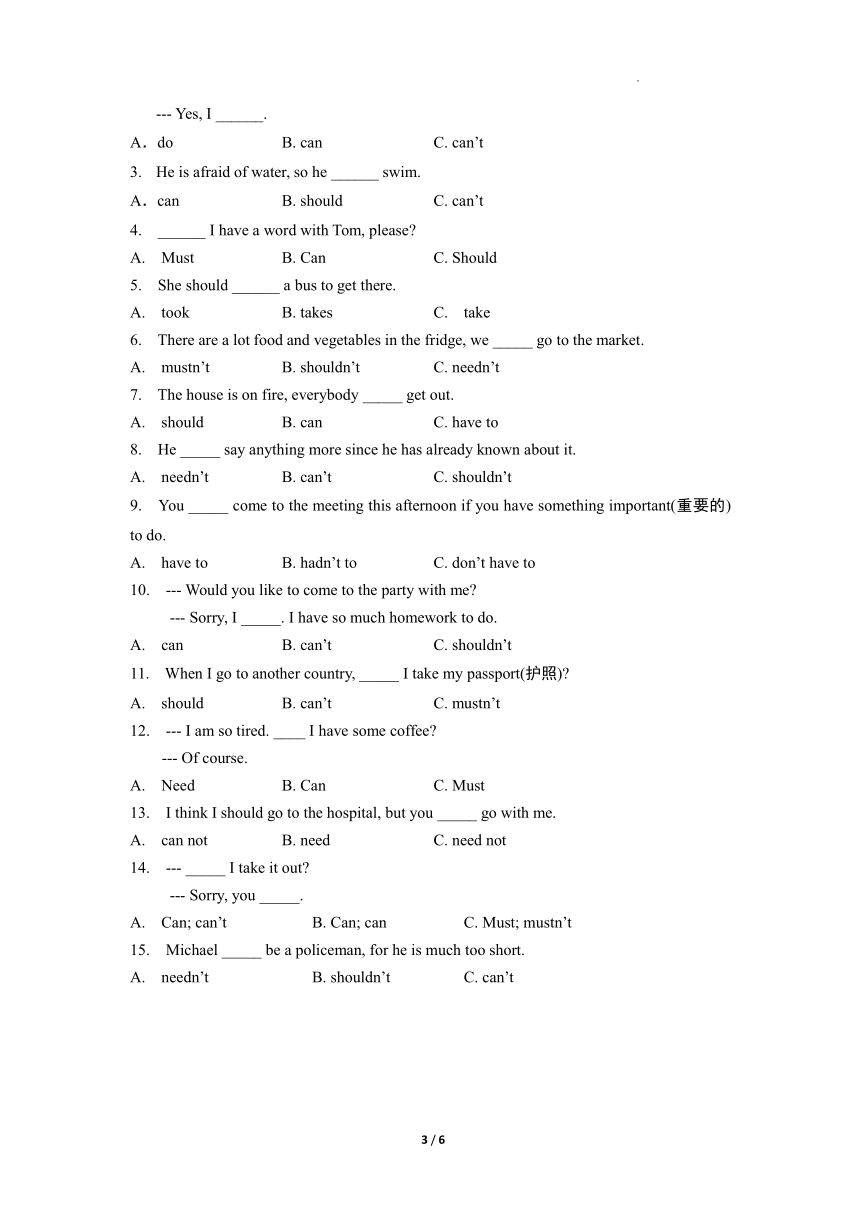小升初复习专题——情态动词专项讲解与练习(含答案)
文档属性
| 名称 | 小升初复习专题——情态动词专项讲解与练习(含答案) |  | |
| 格式 | docx | ||
| 文件大小 | 41.1KB | ||
| 资源类型 | 教案 | ||
| 版本资源 | 通用版 | ||
| 科目 | 英语 | ||
| 更新时间 | 2022-05-03 19:55:46 | ||
图片预览



文档简介
情态动词
【小助手】
【can】
含义:1. “能,会”,表能力
He can sing. 他能唱歌。
2. 请求做某事
Can I have a cup of coffee, please 我能喝一杯咖啡吗?
can 能,会
cannot = can’t 不能,不会
He can play the piano. 他会弹钢琴。
He can’t play the piano. 他不会弹钢琴。
情态动词的用法:
情态动词后跟动词原形。
情态动词无三单。
【must & have to】
含义:must表示“必须”,侧重主观看法。
I must finish my homework. 我必须完成作业。
have to表示“不得不”,侧重客观需求。
It’s going to rain, so you have to take your umbrella. 马上下雨了,你不得不带上伞。
must 必须 mustn't 禁止
have/has to 不得不 don't/doesn’t have to 不需要
have to的形式会随着时间,人称的不同有所变化
You mustn’t speak loudly. 你禁止大声说话。
You don’t have to wash the car. 你不需要洗车。
【need】
含义:need表示“需要”
I need drink some water. 我需要喝一些水。
need 需要
need not = needn’t 不需要
She need wash the car. 她需要洗车。
She needn’t sleep. 她不需要睡觉。
【should】
含义:should表示“应该,应当”
She should see the doctor. 她应该去看医生。
should 应该,应当
should not = shouldn’t 不应该
He should do some sports. 他应该做一些运动。
He shouldn’t eat so much junk food. 他不应该吃那么多的垃圾食品。
【大练兵】
He ______ get up before 7 o’clock.
A. has to B. have to C. has
--- Can you speak Spanish
--- Yes, I ______.
A.do B. can C. can’t
He is afraid of water, so he ______ swim.
A.can B. should C. can’t
4. ______ I have a word with Tom, please
A. Must B. Can C. Should
5. She should ______ a bus to get there.
A. took B. takes C. take
6. There are a lot food and vegetables in the fridge, we _____ go to the market.
A. mustn’t B. shouldn’t C. needn’t
7. The house is on fire, everybody _____ get out.
A. should B. can C. have to
8. He _____ say anything more since he has already known about it.
A. needn’t B. can’t C. shouldn’t
9. You _____ come to the meeting this afternoon if you have something important(重要的) to do.
A. have to B. hadn’t to C. don’t have to
10. --- Would you like to come to the party with me
--- Sorry, I _____. I have so much homework to do.
A. can B. can’t C. shouldn’t
11. When I go to another country, _____ I take my passport(护照)
A. should B. can’t C. mustn’t
12. --- I am so tired. ____ I have some coffee
--- Of course.
A. Need B. Can C. Must
13. I think I should go to the hospital, but you _____ go with me.
A. can not B. need C. need not
14. --- _____ I take it out
--- Sorry, you _____.
A. Can; can’t B. Can; can C. Must; mustn’t
15. Michael _____ be a policeman, for he is much too short.
A. needn’t B. shouldn’t C. can’t
【解析】
1. 答案:【A】
句意:他不得不7点前起床。
解析:“have/has to”表示“不得不”,主语“he”为三单,因此选A。
2. 答案:【B】
句意:---你能讲西班牙语吗?----是的,我能。
解析:“can”表能力,用“can”提问“can”回答,答语为肯定回答,因此选B。
答案:【C】
句意:他害怕水,所以他不会游泳。
解析:“can”表能力,“should”表示“应该”,根据句意,不会游泳,因此选C。
答案:【B】
句意:我能和Tom说句话吗?
解析:“can”除了表能力,还可以用于表示请求的问句中,因此选B。“must”表示“必须”,“should”表示“应该”。
答案:【C】
句意:她应该乘坐公交车去那里。
解析:“should”表示“应该”,是情态动词,情态动词后面跟动词原形,因此选C。
答案:【C】
句意:冰箱里还有很多的食物和蔬菜,我们不需要去市场。
解析:根据句意,不需要的英文表达为“needn’t”, “mustn’t”译为“禁止”,“shouldn’t”译为“不应该”,因此选C。
答案:【C】
句意:房子着火了,每个人不得不出去。
解析:“should”表示“应该”,“can”表能力,根据句意,应该选C,“have to”表示“不得不”。
答案:【A】
句意:他不需要多说什么了因为他已经知道了。
解析:“needn’t”译为“不需要”,“can’t”译为“不能”,“shouldn’t”译为“不应该”,根据句意,因此选A。
答案:【C】
句意:如果你有重要的事情要做,下午的会议你就不需要来了。
解析:“have to”表示“不得不”,根据句意,是不需要参加,“have/has to”的否定形式为“don’t/ doesn’t have to”,因此选C。
答案:【B】
句意:---你想跟我一起去参加派对吗?---对不起,我不能去。我有很多作业要做。
解析:“can”表能力,“can’t”译为“不能”,“shouldn’t”译为“不应该”,根据句意,是不能去,因此选B。
答案:【A】
句意:当我去另一个国家的时候,我应该带上我的护照吗?
解析:“should”译为“应该”,“can‘t”译为“不能”,“mustn’t”译为“禁止”,根据句意,应该选A。
答案:【B】
句意:---我很累,我能喝一些咖啡吗?---当然。
解析:“can”除了表能力,还可以用于表示请求的问句中,因此选B。“need”表示“需要”,“must”表示“必须”。
答案:【C】
句意:我需要去看医生,但是你不需要跟我一起。
解析:“can not”译为“不能”,“need not”译为“不需要”,根据句意,应该选C。
答案:【A】
句意:---我能把它拿出来吗?---抱歉,不能。
解析:“can”表示能,must“表示必须,“mustn’t”译为“禁止”,根据句意,因此选A。
答案:【C】
句意:Michael不能当警察,因为他太矮了。
解析:“needn’t”译为“不需要”,“shouldn’t”译为“不应该”,“can’t”译为“不能”,根据句意,因此选C。
5 / 6
【小助手】
【can】
含义:1. “能,会”,表能力
He can sing. 他能唱歌。
2. 请求做某事
Can I have a cup of coffee, please 我能喝一杯咖啡吗?
can 能,会
cannot = can’t 不能,不会
He can play the piano. 他会弹钢琴。
He can’t play the piano. 他不会弹钢琴。
情态动词的用法:
情态动词后跟动词原形。
情态动词无三单。
【must & have to】
含义:must表示“必须”,侧重主观看法。
I must finish my homework. 我必须完成作业。
have to表示“不得不”,侧重客观需求。
It’s going to rain, so you have to take your umbrella. 马上下雨了,你不得不带上伞。
must 必须 mustn't 禁止
have/has to 不得不 don't/doesn’t have to 不需要
have to的形式会随着时间,人称的不同有所变化
You mustn’t speak loudly. 你禁止大声说话。
You don’t have to wash the car. 你不需要洗车。
【need】
含义:need表示“需要”
I need drink some water. 我需要喝一些水。
need 需要
need not = needn’t 不需要
She need wash the car. 她需要洗车。
She needn’t sleep. 她不需要睡觉。
【should】
含义:should表示“应该,应当”
She should see the doctor. 她应该去看医生。
should 应该,应当
should not = shouldn’t 不应该
He should do some sports. 他应该做一些运动。
He shouldn’t eat so much junk food. 他不应该吃那么多的垃圾食品。
【大练兵】
He ______ get up before 7 o’clock.
A. has to B. have to C. has
--- Can you speak Spanish
--- Yes, I ______.
A.do B. can C. can’t
He is afraid of water, so he ______ swim.
A.can B. should C. can’t
4. ______ I have a word with Tom, please
A. Must B. Can C. Should
5. She should ______ a bus to get there.
A. took B. takes C. take
6. There are a lot food and vegetables in the fridge, we _____ go to the market.
A. mustn’t B. shouldn’t C. needn’t
7. The house is on fire, everybody _____ get out.
A. should B. can C. have to
8. He _____ say anything more since he has already known about it.
A. needn’t B. can’t C. shouldn’t
9. You _____ come to the meeting this afternoon if you have something important(重要的) to do.
A. have to B. hadn’t to C. don’t have to
10. --- Would you like to come to the party with me
--- Sorry, I _____. I have so much homework to do.
A. can B. can’t C. shouldn’t
11. When I go to another country, _____ I take my passport(护照)
A. should B. can’t C. mustn’t
12. --- I am so tired. ____ I have some coffee
--- Of course.
A. Need B. Can C. Must
13. I think I should go to the hospital, but you _____ go with me.
A. can not B. need C. need not
14. --- _____ I take it out
--- Sorry, you _____.
A. Can; can’t B. Can; can C. Must; mustn’t
15. Michael _____ be a policeman, for he is much too short.
A. needn’t B. shouldn’t C. can’t
【解析】
1. 答案:【A】
句意:他不得不7点前起床。
解析:“have/has to”表示“不得不”,主语“he”为三单,因此选A。
2. 答案:【B】
句意:---你能讲西班牙语吗?----是的,我能。
解析:“can”表能力,用“can”提问“can”回答,答语为肯定回答,因此选B。
答案:【C】
句意:他害怕水,所以他不会游泳。
解析:“can”表能力,“should”表示“应该”,根据句意,不会游泳,因此选C。
答案:【B】
句意:我能和Tom说句话吗?
解析:“can”除了表能力,还可以用于表示请求的问句中,因此选B。“must”表示“必须”,“should”表示“应该”。
答案:【C】
句意:她应该乘坐公交车去那里。
解析:“should”表示“应该”,是情态动词,情态动词后面跟动词原形,因此选C。
答案:【C】
句意:冰箱里还有很多的食物和蔬菜,我们不需要去市场。
解析:根据句意,不需要的英文表达为“needn’t”, “mustn’t”译为“禁止”,“shouldn’t”译为“不应该”,因此选C。
答案:【C】
句意:房子着火了,每个人不得不出去。
解析:“should”表示“应该”,“can”表能力,根据句意,应该选C,“have to”表示“不得不”。
答案:【A】
句意:他不需要多说什么了因为他已经知道了。
解析:“needn’t”译为“不需要”,“can’t”译为“不能”,“shouldn’t”译为“不应该”,根据句意,因此选A。
答案:【C】
句意:如果你有重要的事情要做,下午的会议你就不需要来了。
解析:“have to”表示“不得不”,根据句意,是不需要参加,“have/has to”的否定形式为“don’t/ doesn’t have to”,因此选C。
答案:【B】
句意:---你想跟我一起去参加派对吗?---对不起,我不能去。我有很多作业要做。
解析:“can”表能力,“can’t”译为“不能”,“shouldn’t”译为“不应该”,根据句意,是不能去,因此选B。
答案:【A】
句意:当我去另一个国家的时候,我应该带上我的护照吗?
解析:“should”译为“应该”,“can‘t”译为“不能”,“mustn’t”译为“禁止”,根据句意,应该选A。
答案:【B】
句意:---我很累,我能喝一些咖啡吗?---当然。
解析:“can”除了表能力,还可以用于表示请求的问句中,因此选B。“need”表示“需要”,“must”表示“必须”。
答案:【C】
句意:我需要去看医生,但是你不需要跟我一起。
解析:“can not”译为“不能”,“need not”译为“不需要”,根据句意,应该选C。
答案:【A】
句意:---我能把它拿出来吗?---抱歉,不能。
解析:“can”表示能,must“表示必须,“mustn’t”译为“禁止”,根据句意,因此选A。
答案:【C】
句意:Michael不能当警察,因为他太矮了。
解析:“needn’t”译为“不需要”,“shouldn’t”译为“不应该”,“can’t”译为“不能”,根据句意,因此选C。
5 / 6
